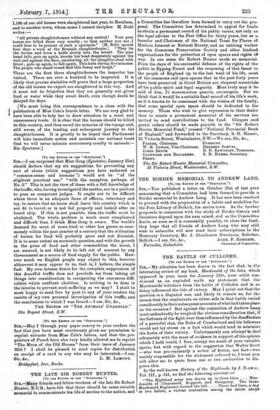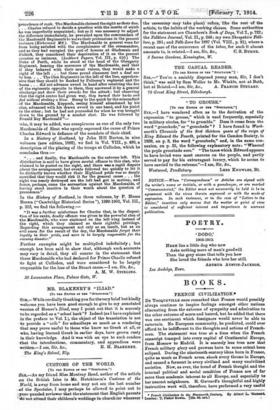THE BATTLE OF CULLODEN.
[To na EDITHE or ems ..Eractrzos.") SIB,—My attention has been drawn to the fact that, in tle interesting review of my book, Macdonald of the Isles, which appeared in your. issue for January 246, your critic con- demned as an exploded myth my statement that the Macdonalds withdrew from the battle of Culloden and in so doing influenced the tide of victory. May I point out that the question is a disputed one, and likely to remain so, for tke reason that the combatants on either aide in that battle varied considerably in their subsequent accounts of what had taken place on the occasion P But against the contention of Andrew Lang must undoubtedly be weighed the obvious consideration that, if the fortunes of the fight were thus influenced by the disaffection of a powerful clan, the Duke of Cumberland and his followers would not lay stress on a fact which would tend to minimize the kudos of their victory. Unfortunately any attempt to deal adequately with the mass of evidence in support of the opinion which I hold would, I fear, occupy too much of your valuable space; but with regard to the suggestion that Walter Scott —who was pre-eminently a writer of fiction, not factwas mainly responsible for the statement referred to, I trust you will allow me to quote from one or two authorities to die-
prove this.
In the well-known History of the Highlands, by J. Biorr_te, Vol. III., p. 241, we find the following account :--
" The Highland army was drawn up in three lines . . . Mao- donalds of Clanranald. Keppech, and Glengarry. The three Macdonald Regiments formed the left.. . . There had been, a day or two before, a violent contention among the chiefs aboALt 'precedence of rank. The Mscdonalds claimed therighb as their due.
. Charles refused to decide a question with the merits of which .he evesmperfectly acquainted; but as it was necessary to adjust the difference immediately, he prevailed upon the commanders of :the Maodonald'llegiraenta to waive their pretensions in the present 'instance (larkeonnel MB.). The Macdonalda in general were for from being satisfied with the complaisance of the commanders, and as they had occupied the post of honour • at Gladsmuir and Falkirk, they considered their deprivation of it on the present occasion se ominous. (Lockhart Papers,- Vol. III., p. 510.) The 'Duke of Perth, while he stood at the head of the Glengarry 'Regiment, hearing the murmurs of the Mandonalds, said that if they behaved with their usual valour, they would make a right of the left . but these proud clansmen lent a deaf ear to him. . . . The Clan Regiments on the left of the line, apprehen- ' sive that they should be flanked by Pulteney's regiment and the horse . . . did not advance sword in hand after receiving the fire .cf the regiments opposite to them, they answered it by a general discharge and drew their swords for the attack but observing that the right centre bad given way, they turned their back. and fled without striking a blow. Stung to the quick by the misconduct of the Macdonalds, Keppoch, seeing himself abandoned by his clan, advanoed with his drawn sword in one hand, and his pistol in the other ; but he had not proceeded far when he was brought -down to the ground by a musket shot. He was followed by Donald Boy Macdonald "- who, who, it may be added, was conspicuous as one of the only two Macdonalds of Sleet who openly espoused the cause of Prince Charles Edward in defiance of the mandate of their chief.
In a History of Scotland, by john Hill Burton, in nine volumes (new edition, 1898), we fwd in Vol. VIM, p. 490, a description of the placing of the troops at Culloden, which he concludes thus!—
" . and finally, the Macdonalds on the extreme left. This distribution is said to have given mortal offence to this elan, who claimed to be posted on the right, and there was a rapid dispute about the arrangement, but events followed too quickly to let it be distinotly known whether their Highland pride was so deeply mortified that they would risk it for the general cause . . . the right was nearly destroyed are the left had got in motion; and hence, perhaps, came the accusation against the Macdonalds, of leaving stood inactive in their wrath about the question of precedence."
In the History of Scotland, in three volumes, by P. Hume Brown (" Cambridge Historical Series "), 1899.1902, Vol.
p. 323, we find the following "It was a further misfortune for Charles that, in the disposi- tion of his make, deadly offence was given to the powerful clan of the Maeda/raids, who were stationed on the left wing instead of the r*ht, which they claimed as their rightful privilege. Regarding this arrangement not only as an insult, but as an evil omen for the result of the clay, the liacdonalde forgot their .loyalty is their pride, and were to be largely responsible for the ensuing disaster."
Further examples might be multiplied indefinitely ; but - enough has been said to show that, although such accounts may vary in detail, they all concur in the statement that those Macdonald, who had declared for Prince Charlie refused to fight at Culloden, and were considered to be largely vesponsible for the loss of the Stuart cause.—I em, Sir, dc., A. M. W. STIRLING. 30 Launceston Place, Palace Gate, IV.











































 Previous page
Previous page